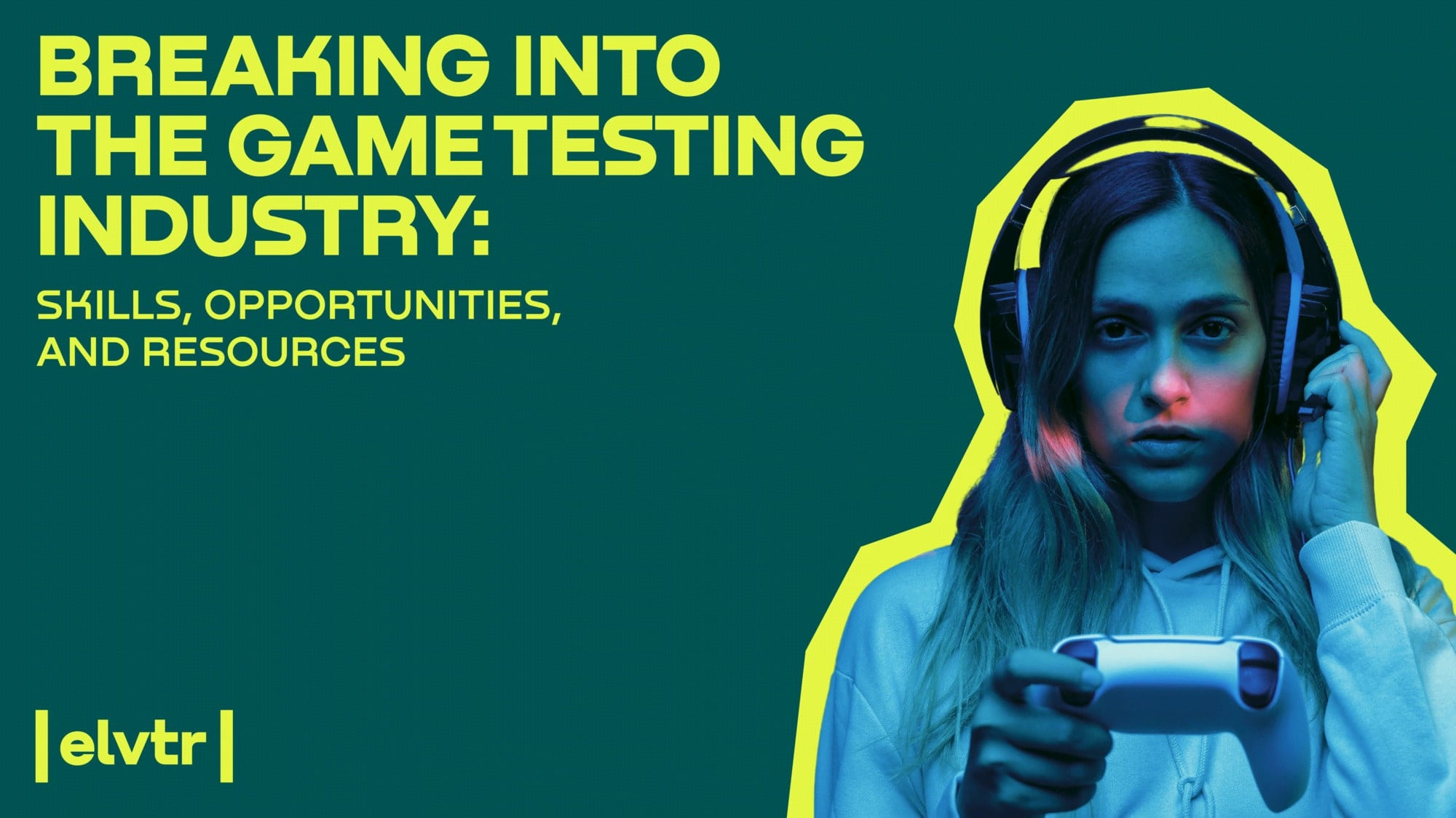- MAIN PAGE
- – elvtr magazine – BREAKING INTO THE GAME TESTING INDUSTRY: SKILLS, OPPORTUNITIES, AND RESOURCES
BREAKING INTO THE GAME TESTING INDUSTRY: SKILLS, OPPORTUNITIES, AND RESOURCES

You’re playing your favorite video game in the evening. Suddenly, you notice a glitch or see that the logic is off for some reason. If you are attentive to detail, this is probably not the first time you have spotted something like that.
It also means that game testing might be just the right choice for you. Let’s see whether you are a good match for this job:
- Do you often notice and appreciate the small details that others might overlook?
- Are you able to approach challenges with patience and determination, even when faced with setbacks?
- Do you enjoy solving puzzles, finding solutions, and troubleshooting issues, even in unfamiliar situations?
- Can you express your thoughts and ideas clearly and effectively, whether in writing or in conversation?
- Do you find yourself thinking critically and considering multiple perspectives before making decisions?
- Are you curious about learning and understanding various subjects, even beyond your comfort zone?
- Are you comfortable adapting to new technologies and tools, even if they are initially unfamiliar?
- Do you enjoy collaborating with others and contributing to a team's success?
- When faced with challenges, do you persevere and explore different approaches until you find a solution?
- Do you take pride in the quality of your work and strive to deliver your best effort?
Count how many times you’ve answered “yes” while reading these questions. If it’s more than 6, you’ll likely have great potential in game testing. But it doesn’t end with your personal qualities. Like with any other job, you also need to possess some knowledge, skills, and a portfolio to receive a job offer. Below, we will discuss how to kickstart a game testing career and what you should pay attention to.
Recommended courses
The Skills You Need
As the video game industry is such a dynamic field with lots of different products, you’ll need to continuously improve your skills. With a well-rounded skill set, you will not only excel in finding and resolving bugs but also contribute to overall player experience improvement.
Here are the soft skills that are necessary for a game tester:
- Attention and ability to focus: Perfectionism might not always be convenient, but you can utilize it as a game tester. You need to be good at noticing the smallest bugs and inaccuracies.
- Patience and perseverance: Sometimes, you’ll need to go through a game over and over again just until you find all the problems. You will get tired or bored at some point if you don’t have enough patience.
- Problem-solving: A game tester goes far beyond identifying the issues. They also suggest ways to fix bugs and find solutions to problems.
- Communication and teamwork: In the game industry, you rarely work alone. You should be able to communicate clearly and adapt to a team’s working pace.
- Flexibility: Not all the games you’ll play will be your favorite ones. You should be okay with learning new things and changing your way of doing things if needed.
- Curiosity and genuine interest in gaming: You should be interested in learning how games work and enjoy exploring how different parts fit together.
While demanded hard skills might be different for each company, we’ve gathered the most common ones in this list:
- Gaming experience: Familiarity with games across different genres to understand common mechanics and trends.
- Technical proficiency: Basic understanding of gaming platforms, devices, and software tools used for testing.
- Bug tracking tools: Familiarity with bug tracking software to document and report issues effectively.
- Analytical skills: Ability to break down complex problems, identify patterns, and analyze game behavior.
- Basic programming knowledge: Some understanding of coding can help when dealing with technical issues.
- Quality assurance techniques: Knowledge of testing methodologies, including regression, compatibility, and usability testing.
- User experience (UX) understanding: Recognizing elements that contribute to a positive player experience.
- Version control systems: Familiarity with systems that manage changes in the game's code and assets.
- Multimedia skills: Knowledge of image and video editing tools to enhance bug reporting.
- Console and platform knowledge: Understanding the specific requirements and constraints of different gaming platforms.
The Opportunities You Have
Everyone started somewhere. Thousands of people begin their careers every day and worry about their job perspectives. Don’t be afraid to apply for different positions even if you don’t have a big portfolio or many references. There are enough fields in game testing newbies can choose from.
Check this list of positions suited for entry-level specialists:
- QA tester: This is the most common entry-level position for game testing. Quality Assurance (QA) testers are responsible for identifying bugs, glitches, and issues in games.
- Functional tester: Functional testers focus on testing specific functions, features, or mechanics. In this position, you are most likely to work with gameplay elements, user interfaces, or interactions.
- Localization tester: Localization testers ensure that games are properly translated and culturally adapted for different regions and languages. This role involves verifying text, audio, and other content.
- Compatibility tester: They make sure games work smoothly on different platforms (consoles, PCs, mobile devices) and configurations. Compatibility testers work with performance issues, compatibility with hardware, and system requirements.
- Usability tester: Usability testers evaluate the user experience of a game, focusing on how intuitive and enjoyable it is for players.
- Indie game tester: Indie developers often seek testers for their smaller-scale games. These roles can provide a diverse range of testing experiences.
- Beta tester: Participating in beta tests for games can be a way to gain experience. You need to play pre-release versions and provide feedback.
- Contract or temporary positions: Game studios often need more workforce for specific projects or during busy periods.
- Internships and junior positions at game studios: You might not find these positions on job boards, so better look for them directly on game studios’ websites.
The Resources You Can Use
You can make your path a bit easier with the right people and tools:
- Online game testing communities: You can explore the latest trends in the gaming community using services like Reddit's r/gaming, GameDev.net, and Unity Forums.
- LinkedIn or other social networks: Social networks are full of groups and communities devoted to gaming. You can also connect with other professionals in the industry and follow game development companies.
- Job boards: Go through Indeed, Glassdoor, and Gamasutra to find relevant job offers. Track the job openings you’re interested in to develop your skillset according to the listed requirements.
- Gaming events and conferences: Attend game industry events like GDC (Game Developers Conference) and local meetups to network and learn about opportunities.
- Testing tools and software: Popular bug-tracking tools like JIRA, TestRail, and Bugzilla provide solid knowledge to game testers who want to learn how to use their software.
- Portfolio building platforms: You can use Behance or GitHub to create an appealing portfolio that shows your latest projects.
Network, explore, and open new career horizons in the video game industry. Game testing is a rewarding career that will always challenge you and provide new growth opportunities. One year from now, you will be happy that you started building your career today.
*ELVTR is disrupting education by putting proven industry leaders in a virtual classroom with eager rising stars. ELVTR courses offer 100% instructor driven content designed to give you practical knowledge within a convenient time frame. Choose the right course for you!


 APPLY
APPLY